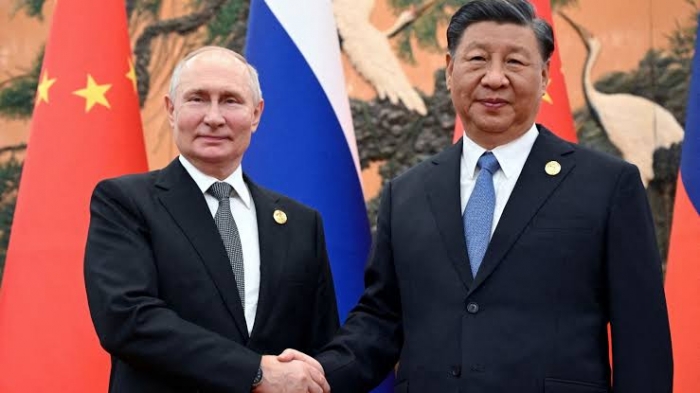WESTERN PERSPECTIVE
Putin backs China's Ukraine peace plan, says Beijing understands the conflict
Russian President Vladimir Putin, in an interview published early on Wednesday, said he backed China's plan for a peaceful settlement of the Ukraine crisis, saying Beijing had a full understanding of what lay behind the crisis.
Putin, speaking to China's Xinhua news agency ahead of his visit to Beijing this week, said Russia remained open to dialogue and talks to solve the more than two-year-old conflict.
China's plan and further "principles" made public by President Xi Jinping last month took account of factors behind the conflict, Putin said.
"We are positive in our assessment of China's approach to solving the Ukrainian crisis," Putin said, according to a Russian-language transcript on the Kremlin website. "In Beijing, they truly understand its root causes and its global geopolitical meaning."
And the additional principles, set down by Xi in talks with German Chancellor Olaf Scholz, were "realistic and constructive steps" that "develop the idea of the necessity to overcome the cold war mentality".
Beijing put forward a 12-point paper more than a year ago that set out general principles for ending the war, but did not get into specifics.
It received a lukewarm reception at the time in both Russia and Ukraine, while the U.S. said China was presenting itself as a peacemaker but reflecting Russia's "false narrative" and failing to condemn its invasion.
Russian Foreign Minister Sergei Lavrov last month called the proposal a "reasonable plan that the great Chinese civilization proposed for discussion."
Xi's additional principles call for a "cooling down" of the situation, conditions for restoring peace and creating stability and minimising the impacts on the world economy.
Russia views the conflict as a struggle pitting it against the "collective West" which took no account of Moscow's security concerns by promoting the eastward expansion of NATO and military activity close to its borders.
Russia calls its actions in Ukraine a "special operation" to disarm Ukraine and protect it from fascists. Ukraine and the West say the fascist allegation is baseless and that the war is an unprovoked act of aggression.
Russia and China proclaimed a "no limits" relationship just days before Moscow launched its invasion of Ukraine in February 2022, but Beijing has so far avoided providing actual weapons and ammunition for Russia's war effort.
Ukrainian President Volodymyr Zelenskiy's peace plan calls for a withdrawal of Russian troops, the restoration of its 1991 post-Soviet borders and bringing Russia to account for its actions.
A "peace summit" is scheduled for Switzerland in June. But Russia is not invited, dismisses the initiative as meaningless and says talks must take account of "new realities".
China has attended some preparatory talks for the summit and Ukraine has deployed great efforts to persuade it to attend.
RUSSIAN PERSPECTIVE
‘No’ deal between Moscow and Kiev – London
Britain will not support any solution to the ongoing conflict between Russia and Ukraine that involves what it sees as concessions to Moscow, Defense Secretary Grant Chapps told Times Radio on Tuesday.
The UK has been among the largest arms donors to Kiev. In recent weeks, London has stepped up its rhetoric by saying that the British weapons supplied to Ukraine may be used for attacks deep inside Russia. Moscow recently summoned the UK ambassador over the matter and warned of possible retaliation, including strikes targeting “any British military facilities and equipment” in Ukraine and beyond.
Earlier on Tuesday, Chapps confirmed that Kiev could use British-supplied weapons to strike Russia’s Crimean Peninsula. London considers the region, which joined Russia in 2014 following a referendum, to be an “integral part of Ukraine,” the defense secretary stated.
When asked by Times Radio about whether London would consider any agreement between Moscow and Kiev, Chapps simply answered: “No.” He then further elaborated that the UK sees “no sense at all” in persuading or “strong-arming” Ukraine into accepting any peace conditions and “giving up some of their territory.”
Apart from Crimea, four other former Ukrainian territories – two Donbass Republics and Kherson and Zaporozhye Regions – joined Russia in autumn 2022 following a series of referendums. Kiev branded the votes a “sham”and claims as its own all four regions and Crimea.
On Tuesday, Chapps maintained that the only way to end the conflict was by inflicting a military defeat on Russia. “I do not think it is plausible at all for [Russian President Vladimir] Putin to win this war,” he said, calling for increased arms shipments to Ukraine.
“It is very, very important that the US follows the UK lead. Remember: we’ve just increased our money to Ukraine this year to £3 billion ($3.78 billion), our biggest-ever package,” the defense secretary said, referring to an earlier announcement by Prime Minister Rishi Sunak, who committed to spend that sum on military support for Ukraine per year.
Chapps also indirectly compared modern Russia to Nazi Germany by saying that “we have been in this position before in Europe and we will simply not allow that to happen again.”
“If you give a bully like Putin an inch, he will take a mile. In this case, he will probably take quite a lot, not just Ukraine. I’m not sure he will stop there either,” Chapps added.
In the years prior to World War II, Western nations are seen as having sought to appease Adolf Hitler, most notably through the infamous 1938 Munich Agreement, under which Germany, Italy, Great Britain, and France coerced Czechoslovakia into surrendering its border regions to Germany.
Russia has repeatedly stated throughout the conflict that its goals are to protect the people of Donbass against persecution by Kiev and ensure its own security in light of constant NATO expansion toward its borders. Moscow has also repeatedly pointed to the nationalist nature of the Western-backed post-Maidan governments in Kiev that have persecuted Russian-speaking minorities in Ukraine.
Reuters/RT

































































